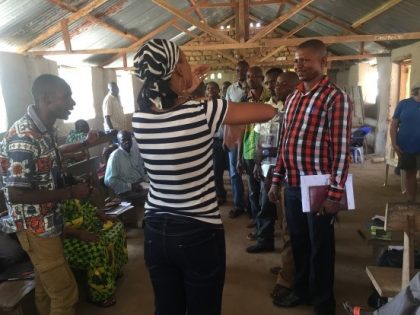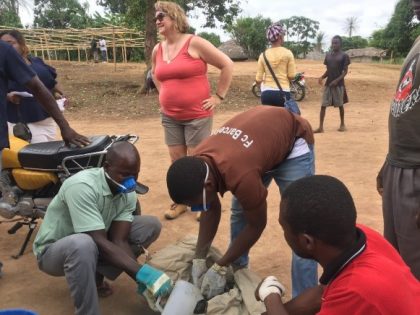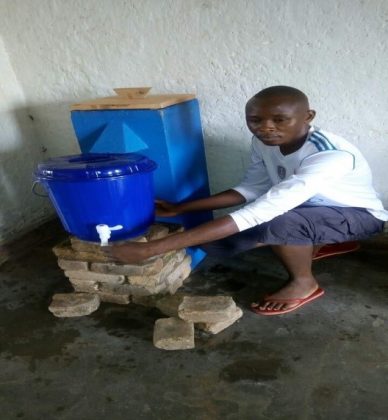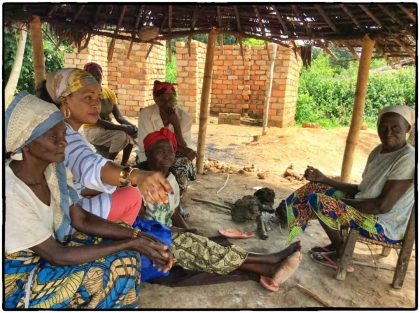This Congo training program was a huge success, and work for the people of Ango (and the refugees from the Central African Republic) is ongoing. Read here below about the harrowing updates from an original trip to this remote region, and the equally exciting follow-up journey. To read about the initial program and learn more about this work, please CLICK HERE to go to the original program page.
ANGO, CONGO – PERHAPS OUR MOST DIFFICULT PROJECT EVER!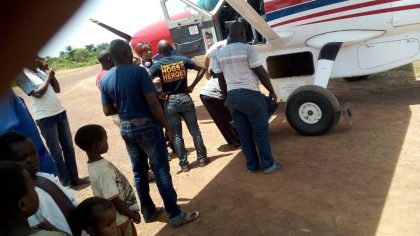
Together with our partners at Friendly Water to whom we are extremely grateful, and with your assistance, we embarked on our most difficult bio-sand filter training undertaking – and, frankly, that says a lot! Ango is in Bas Uele Province in north-central Congo-DRC, near the border with the Central African Republic. It is a “village”, but, with its surrounding population, has about 100,000 people, all living on subsistence (or sub-subsistence) agriculture. The area is very isolated. Road travel is extremely difficult, and the area is very cut off, as the war in northeast Congo (some 900 miles away) to the east makes supply provision extraordinarily difficult. The provincial capital – Kisangani – is more than 500 miles away (14 hours under ideal conditions) by road.
There are several schools (some of them currently occupied by refugees). There once was a health clinic, now abandoned, and few or no medical supplies. There are very high rates of child mortality and morbidity, mostly from waterborne illnesses, as well as malaria. Typhoid is endemic. No doctors, no nurses. There is one well. Housing consists mostly of grass and thatch huts. There are churches (both Catholic and Protestant), and a mosque.
The ongoing war in the Central African Republic – ostensibly a religious one, including the Lord’s Resistance Army and Muslim insurgents, but really just a struggle for power – and a lack of stability – has sent thousands of refugees, both Christian and Muslim, into the province, in areas around Ango. There is no NGO or United Nations or government presence to deal with them. They are mostly welcomed by the local inhabitants, provided with space to build a hut, and food is shared as people are able. There is no reported violence in the area.
Neema Paininye, who was born in Ango but who lives in Tracy, California, returns to Ango at least twice a year. She visits with her family (her mother and sister are still there, both often sick with typhoid), and as the founder of Ango Compassionate Hearts (www.achearts.com), brings medical supplies and other things of benefit to the community, and works with community leaders to try to better conditions there. On her most recent visit, she began working with refugees in a surrounding community as well. With difficulty, she also arranged for the construction of a well. She has been in touch with Friendly Water for more than two years and came to the August 2017 training, where she made many friends.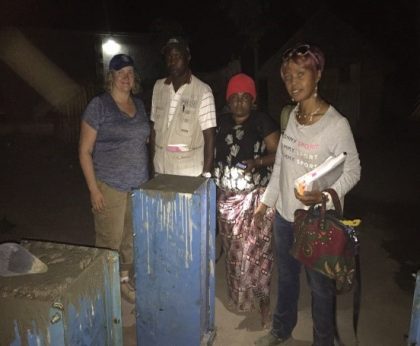
One of them is Holly Myers is Environmental Health Director of Yakima Health District, one of the largest health districts in Washington State. She met up with Friendly Water at the annual Washington Environmental Health Association (WEHA) Conference three years ago and had wanted to come to our training since. She brings a wealth of knowledge on all aspects of environmental health (though she hasn’t traveled abroad previously), and an encyclopedia of people who can help! She will do an environmental health survey of the entire community.
Joining them is Dr. Riziki Mupendelevu is a general practitioner from Goma who deals primarily with children. She has trained many groups in Congo-DRC, including one in Butembo where BioSand Filter sales support her health clinic treating war orphans and refugees. She has dealt with all waterborne illnesses endemic to Congo-DRC.
Here is an initial report from the field:
The team arrived in Uganda several days ago. Our Uganda Representative Richard Kyambadde provided them with training in soapmaking (there is no soap in Ango). Materials were gathered, with steel molds made in Kampala. There is a very large shipment of basic medical supplies. At the last minute, Holly was granted a Congo visa (a major prize!) Then eight hours on the road to Bunia, where, after three days, they will be picked up by a medical mission plane and flown to Ango. They have now made it over the border.
What we hoped to accomplish on this adventure (there will be others):
– Training two groups to build BioSand Filters. One group will be an already existing youth group. The other will be widows nominated by several churches. We have allocated enough funds so that each trainee will be able to get a Filter for their own family at cost (system to be worked out)
– Training one group in soapmaking.
– Conducting an environmental health assessment. Led by Holly, the team will try to assess where “the low-hanging fruit is”. Where would be the most cost-effective future interventions? Is it better food storage? Water? Mosquitos? Waste disposal? Toilets? Rainwater catchment? Where would an NGO (not necessarily us) get the most “bang for the buck”?
– Provide basic medical care. Obviously, the needs are overwhelming. Besides helping to lead BioSand training, Dr. Riziki will provide medical services to at least some people and train a group of women in the use of the supplies. This may be the start of a larger venture later.
– If there is time, the team may also visit one of the refugees settlements and provide what little advice on water and sanitation they can.
The residents of Ango (and the refugee community) are very highly motivated to improve conditions. Please keep them all in your thoughts and prayers.
-MORE UPDATES-
Our team – Holly Myers (Ellensburg, Washington), Neema Paininye (Tracy, California), and Dr. Riziki Mupendelevu (Goma, Congo-DRC) did indeed make it to Ango. It was touch and go for a while. With help from our Uganda Representative Richard Kyambadde (Mityana, Uganda), Holly got her visa at the last possible moment – presented by the Ambassador himself – at the Congolese Embassy in Kampala. (I have to tell you – we were quite shocked that she received it. Then they had training in Friendly Soapmaking in Mityana, bundled all the materials onto a truck, went by bus the entire way across Uganda, “fought” with border officials to make it through to Bunia (where there is a major cholera epidemic), met with a future BioSand Filter group, got on a medical mission flight (having to leave one of the steel molds behind to be delivered later because of too much weight), and…landed in Ango.
The training seems to have been a huge success, though so far, the messages that have made it back to us are spotty. Neema writes, “Holly is overwhelmed! We were at the school tonight, and she is still speechless. People are so motivated and so excited! To them, God has remembered them. That’s why He has sent Friendly Water for the World to them. Women are in tears, thanking God for Friendly Water. Local chiefs and the entire population are ready to work. It’s so touching and humbling to witness this.”
They are now on their way home. Dr. Riziki was given a live chicken, which she has taken on the plane (actually two planes). We are looking forward to seeing all the photos and videos (and the chicken!), many of which Holly will present to the Washington State Environmental Health Association Conference.
David Reports:
The Ango team not only made it there but made it HOME! (which to me is almost shocking – they had to go through Bunia, TWICE! center of major violence going on, plus a cholera epidemic. From all accounts, a HUGE success! Holly Myers is coming down here next week to present the results to the Washington State Environmental Health Association (together with a plug for Water Charity – there are quite a few former Peace Corps people who are active in the Association).
David Again: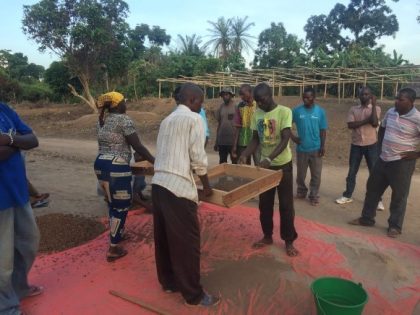
By the way – the Ango project is taking really nicely! Neema is returning in two weeks – two more groups will be set up. And we’ve heard from another town about 100 kilometers away (which is nothing there) that the government wants to assist with BioSand work. Not as remote as Ango either. You did good! I am still pinching myself that we were able to pull it off at all – it is really, really, REALLY remote. I was at a meeting of the Congolese Integration Network near Seattle last Saturday – all Congolese refugees, 90% of women, and they were really shocked that we managed to get there. One had a grandmother who spoke Zande.
Trio on a MISSION to ANGO, Democratic Republic of Congo
Trained at our Anacortes workshop in 2017, Neema Paininye has a passion for the people of Ango, in far northern Congo-DRC, from which she originally hails. Now living in northern California, Neema returns to Ango at least twice a year. The trips are extremely difficult, usually involving a flight to Entebbe in Uganda, purchasing materials in Kampala, taking a bus to the Uganda-Congo border, a long taxi ride on the Congo side to the town of Bunia (which is currently overrun by refugees from the ongoing conflict), and a small, medical mission plane to Ango.
In the Ango area, there are no working hospitals, no international NGOs or charities, and despite refugees streaming down from the Central African Republic, no United Nations refugee camps or assistance of any kind. Essentially, there is no working government there either. Poverty and disease, as well as isolation, are overwhelming.
Neema writes:
I have just returned from my trip to Ango, Dakwa, and Banda. During this trip, I took four molds for our Biosand teams located in Dakwa and Banda.
The trip started from San Francisco on the 24th of July 2018. I arrived in Kampala on the 26th and spent a couple of days there gathering few starting materials for our new Biosand filters team in Dakwa and Banda. Before I left the US, I had already arranged with a welder in Bunia who started working on our four molds beforehand. I left Kampala for Paida by bus and the materials were loaded on a truck to Paida. Having to take everything with me from Paida to Bunia forced me to rent the whole taxi (size of a small four-seat Nissan) and we had it packed, full of starting materials to Bunia.
I reached Bunia on the 30th of July in the afternoon. I was in Bunia for one whole week and my wilder was only able to complete three molds and the other one was not finished so I had to leave that one behind and proceed to Ango on the 7th of August as scheduled by the missionary’s small aircraft we usually charter to get to Ango. The team from Dakwa and Banda was already waiting for me in Ango to collect their materials upon arrival. I must say that since our first Biosand filter training in Ango, words have been spread almost everywhere in the Bas-Uele region and all the surrounding villages about Biosand filters and its benefits. Other than Ango, all other villages are desperately waiting with hope that their village can be the next to benefit from this life-saving opportunity of clean water. All of these people are victims of cholera, typhoid, malaria, diarrhea, etc.
We boarded for Ango on Tuesday morning on the 7th of August 2018.
The people were happy to see me arrive in Ango with all the supplies that afternoon. Our local bio-sand filter team and I had opportunities to visit with the village people the following day and just hear testimonies after testimonies of changed lives and improved health. We saw healthier children and people after installing bio-sand filters in their homes or in their neighborhoods. This was all that I needed to hear, and I made a commitment to them that together we will continue to knock on doors of good people’s hearts to support this cause and continue to change people’s lives all across the region. Some testimonies brought tears to eyes, some brought laughter but in all this, the message was that of gratitude and happiness for changed lives.
The following day, as per the program from Ango Compassionate Hearts, I held a seminar with everyone in the CECA/20 sanctuary where we last held our Biosand filter training and more people showed up thinking that it was another Biosand filter training. It felt almost like I should have canceled the seminars and just do another Biosand filter training, but I didn’t have enough time and also, I was not prepared for full training this trip. People still came with a request for filters, especially widows who can’t afford the 40$/filter cost.
This same day I had to officially give door keys to our nine widows we selected to build small houses for because they were living in houses that were almost falling on them or some just didn’t have a house over their heads. From this meeting, I spent the rest of the day inaugurating those new houses with the widows, a new project initiated by Ango Compassionate Hearts Foundations.
I committed to praying for them and doing what I can to keep knocking on good people’s hearts for more support to this great project. After completing our evaluation of the progress of Biosand filters in Ango, the outcome is very encouraging, the young people in Ango are very involved, regardless of the challenges of transporting the required materials for the job, they are still able to produce filters on a weekly basis, more families are getting filters even though some are paying by installments due to the extreme poverty that’s crippling the entire village. These guys are fired up to beat every challenge that rises against their goal of changing people’s lives to that of healthy people. Reduce hospital bills and increase household income. The team in Ango is well organized and they work every day from 9 in the morning to 5 in the evening.
The last two days of my time in Ango, I was to travel by motorcycle to Dakwa since it was a bit closer to Ango than Banda. I was to escort the team that was carrying their molds and starting materials but it was going to be a whole day trip and my body started signaling that I was already infected with either malaria or typhoid so I sent the team by itself and I arranged to leave Ango the following day in order to rush to the hospital in Bunia, where there are at least few clinics and hospitals even though not the best but better than falling sick in Ango with no hospital at all.
It’s worth mentioning that the lot of medications that we missed taking with us on our trip in April were taken this time and I officially delivered it to the local clinic in Ango. They are very grateful and as the territorial administrator puts it “Many lives will be saved because of this generous donation of medications THANK YOU FRIENDLY WATER & WATER CHARITY.”
After reaching Bunia I fell sick and “YES” it was a combination of malaria and typhoid. I was admitted for 8 days in Bunia, then there was no improvement, so I was rushed to Kampala where I also spent another 7 days in bed but this time I felt much better and with the advice of the doctors, I rested for another one week before boarding the plane for the US. I am glad that people are getting healthier and lives are being impacted in Ango as a result of our magic: Biosand filters. THANK YOU, WATER CHARITY & FRIENDLY WATERS.
For the sake of the people of Bas-Uele, who are desperate for a healthier lifestyle, I am willing to sacrifice my time and energy to go train more people about Biosand filters. Digba and Gwane, Lisala, and Isiro are really in need right now. They are on my heart and I hope they are on yours too. Every day people are still losing lives to typhoid and malaria, waterborne diseases. We can help save lives.
Our trip started in San Francisco on the 7th of April evening. We were supposed to arrive in Kampala early morning on the 9th and meet with Dr. Riziki Kahindo later that afternoon. Dr. Riziki works with friendly waters and lives in Goma. She was to join us in Kampala and proceed with us to Ango. She left Goma one day earlier by bus for Kampala. Unfortunately, Turkish Airlines delayed our flight in San Francisco for over an hour. This delay messed up our entire plan in Kampala where we were supposed to participate in soap-making training and also do shopping for additional filter construction materials before heading to Ango. This delay had us miss our connecting flight in Istanbul and we spent one day waiting to connect with another flight to Kampala. The same day we reached Kampala we had to collect Holly’s visa at the Congolese embassy in KOLOLO, Kampala. Because we run out of time, we had no choice but to combine both our soap-making training and the shopping for our filter construction materials to be completed within two days before we caught the bus for Bunia Friday night. Thanks to Richard who was kind enough to get us most of the materials needed for the entire training. Thanks, Kampala and Mityana. We are leaving for Bunia.
We embarked for Bunia via Paida on the night of the 13th and reached the border at Paida that morning of the 14th. As we were loading our luggage into the rental car, we got the news that we should check with the immigration agent at Mahagi (BORDER SIDE OF CONGO) before resuming our trip to Bunia. Apparently, lots of cases of canceled visas at the border for no apparent reason, (they want more money). After calling the immigration officer at the Congo/ Uganda border to double-check about Holly’s visa, sure enough, we were told Holly’s official visa granted at the Congolese embassy in Kampala was not valid enough to allow her to enter into the CONGO. After hours of negotiations, we were allowed to pay an additional 250$ with no receipt in order to get Holly into the Congo. Thanks to David who rescued us all along this trip and back. One thing we have learned is that the unexpected is always expected in the CONGO.
We finally made it to Bunia around 7 pm in the evening of the 14th. We had so much to carry for this training that we ended up renting three separate cars to get to Bunia. (700$ after negotiations).
We reached Bunia a day before our two other rented cars because the roads are practically awful. The region is experiencing an unbelievable outpouring of rain since late March. After resting for one day in Bunia, our two other rented cars finally made it to Bunia. It took them longer to get to Bunia because these were minibusses and they were fully loaded so they traveled at a slower speed than we did. Even after reaching Bunia there were still few items and necessary materials that we felt were needed so we got them in Bunia.
The following morning, April 17th, 2018, we boarded our plane to head to Ango. The 12-passenger space caravan was full of materials and the three of us (Holly, I and Dr. Riziki) as we headed to Ango via Isiro. We stopped in Isiro to refill the tank and pick up one of our trainees who is actually very instrumental in coordinating things on the ground in Ango.
Day 1:
We landed in Ango around 12:30 pm. We were escorted to our guesthouse (PAM GUEST HOUSE) where we were warmly welcomed. We rested for about 30 minutes and headed to meet the local authorities as required by the law. About an hour later, we headed to our training location and started our training the same day and we constructed our first three bio-sand filters that same evening. This first experience took us the whole evening and we ended the training at around 7:30 pm. We struggled with the light issue because the whole village has no electricity and our solar lamp was not capable of lightening the entire training site.
Day 2:
This was literally our first day of training but because we needed some filters dried and installed before we leave Ango, we had to build our first filters on the same day we arrived in Ango.
We started our day with a general introduction to bio-sand filters and its different components, why use it and so on. Holly also presented on the hygienic part of our training. We had originally planned to train 35 people including then youth, widows, nurses and teachers, but because they need, excitement and also this is something that people have never seen or expected to see in Ango. This drew a larger number of trainees than we had planned. Looking at the desperation on these people’s faces, we decided to train all 55 people who showed up for the training. We had two sessions per day: one session in the morning: from 8:30 am to 1:00 pm and another session in the afternoon from 3:00 pm to 7:30 pm. Our routine was theories in the morning and practice in the afternoon.
Day 3:
We started our day at around 8:30 am as usual and did a brief review of our previous lesson and a few related activities. In the afternoon we got our prep and concrete ready for that evening. We wrapped our training that day at around 8:00 pm. It is important to note that all the 55 people who came for the training were fed three times a day for seven days and all the expenses were on us.
Day 4: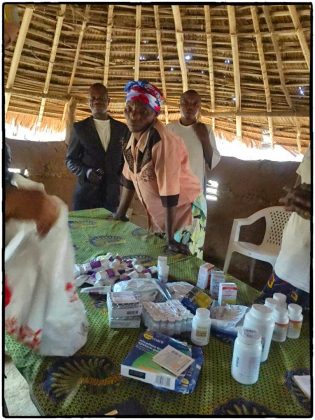
We started our morning session at 8:45 AM with reviews and new theories on sanitation, and few games related to that and this was just such an amazing experience. Our trainees were very engaged in learning, even when it was time to go on a break some of them just hanged around to discuss more on the material learned, making sure they mastered everything they learned that day. This is what has made it very easy for them to carry on with this project even after we left Ango. Every day they work tirelessly to spread the good news (saving lives through the bio-sand filter). We are very proud of this team.
Activities were mostly prepping of the materials and the construction of more filters. At the recommendation of the local pastor, one of our trainees, we switched our concrete pouring and removal time to a daytime schedule so this day we wrapped up our training a little earlier than the previous days. This day the session ended around 6:45 pm.
Day 5:
We started our session at around 8:30 AM. We started with some review of previous lessons and themes, then proceeded with sanitation issues and the many ways of spreading diseases. After this long and interesting learning experience, we took a lunch break from almost 1:00 pm to 3:00 pm. In the afternoon we resumed with preps for our filter-making materials and we also removed the previously built filters.
Day 6:
Because this was a Sunday, we did not have any activity in the morning, so people could attend to their churches. We resumed with our preps and removing of filters to pour new ones in the evening, around 4:00 pm. We also were able to buy 6 cans of painting colors for our first filters that were being installed that Monday morning. We ended our training that day at 7:20 PM.
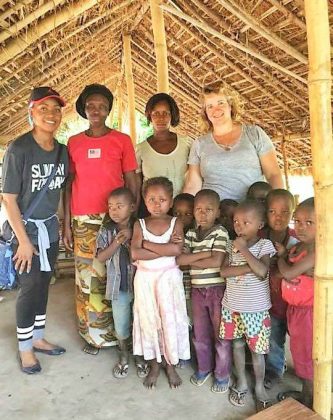
Day 7:
This was our last day of training and also the installation of the first filters that were ready. We started that morning with soap-making training for a couple of hours and then Holly and I had a quick run to one of the schools in the area to give her a glimpse of the dire situation of the school and environment in the area. Around 1:00 pm everyone was dismissed for a lunch break, and then we all returned for filter installation around 2:30 PM. We divided the team into two groups for installation purposes. One group installed at pastor Aron’s house, a very commonplace where lots of children, church people, and widows come for drinking water. Another group went to the hospital for a second installation. After that, we all returned to our training site for the Certificate ceremony.
Day 8:
The third filter was installed at the Catholic Church and also soap distribution to all our participants and few widows who happen to live not far from our training site.
After this training, my life has really changed. Being part of what is going to impact and change people’s lives for the better is something I will never forget. Great experience, people were celebrating as we left Ango for Bunia that Tuesday noon. I am from Ango, I know and understand the challenges that my people face every day for lack of clean water. This is what will change these people’s lives will never be the same. No single life will be lost again because of waterborne illnesses.
Five Years ago, I lost my older sister, my best friend, she was 39 and she died of typhoid and malaria because there was no medication to help her after contracting waterborne viruses. I wish this never happened to her.
But I can work hard together with Friendly Water to the World to make sure that no life is lost to the waterborne disease again in this region. Thank you, David Albert, for working tirelessly to making sure that this project was a success. YES, IT WAS A BIG SUCCESS. NYOSO EKOKI.
